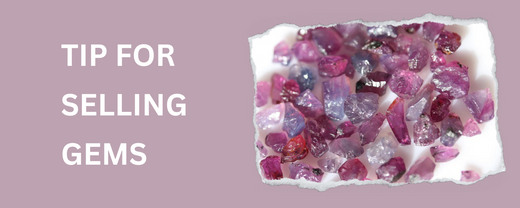Selling Rough Gemstones
Raw gemstones, also known as rough gemstones, are found in natural form and have not been cut or polished. They maintain their natural form, beauty, and unique features. Collectors, jewelry makers, and dealers are the most significant buyers of uncut gemstones. Gemstone dealers buy these stones and then cut, shape, and polish them to give them a finishing look and later use them in jewelry.
Click here to get a quote from Folkmarket Gems on discounted deals and start your own business by selling today!
Jewelry manufacturers purchase uncut gemstones and use them in particular designs or cut pieces according to demand. Buyers frequently search for unpolished gemstones because of these stones' natural beauty and uniqueness to invest in for potential future value growth. Raw gemstones attract a wide variety of customers due to their natural appeal and adaptability.
Jewelry designers buy these stones to use as raw gemstones in their designs or to create unique pieces. Buyers usually look for unpolished gemstones because of their natural beauty and uniqueness. They want to expand their collection to make it investment-worthy in the future. Generally, raw gemstones attract a wide range of buyers due to their natural beauty and customizability.
Sell Loose Gemstones
There are many different types of loose gemstones, each with a unique appearance and features. Some of them are enlisted below:
- Diamonds: Can be colorless or fancy colors. Known for their clarity and bright shine.
- Sapphires: Come in various colors including blue, yellow, and pink, and are prized for their sharpness.

- Rubies: Known for their rich red color, excellent shine, and hardness.
- Emeralds: Feature fantastic transparency due to their rich green tone.
- Other gemstones include aquamarines, topazes, and garnets—each showcasing deep purples, vibrant blues, and flaming oranges.
Discover our premium collection of loose stones and add beauty to your designs.
How to Start Selling Gemstones Online? Platforms Where I Can Sell My Gemstones.
There are several internet marketplaces where you can sell your gemstones, such as:
Online Marketplaces:
Online markets provide an easy way to connect with many potential customers and gemstone enthusiasts. Some popular online marketplaces are:
- eBay: Fixed-price listings or auctions to reach wide audiences.
- Etsy: A creative-focused marketplace for handmade and unique gemstone pieces.
- Amazon: Showcase gemstones to a massive global audience.
- Ruby Lane: Great for rare and vintage gemstone sales.
- Specialized Gemstone Marketplaces: Find buyers who understand value and quality.
- Social Media Platforms: Facebook, Instagram, and Twitter are effective for reaching buyers through visuals and engagement.
3. Gem and Mineral Shows
Attend gem and mineral exhibitions, where buyers and sellers exchange rough gemstones. These gatherings create a lively platform for meeting potential buyers and sellers and provide valuable networking opportunities for the gemstone industry.

4. Local Jewelry Stores
Inquire about potential deals with local jewelry stores. Some dealers may be interested in buying rough stones, especially if they provide polishing and cutting lapidary services. There is an opportunity to form connections and acquire distribution channels in the jewelry stores in your area.
💬 “Thinking of selling locally? Start online to build trust and get fair evaluations before walking into any store.”
5. Gemstone Dealers:
Sellers of gemstones who focus on obtaining rough stones for individual collections or resale. Connecting with these experts can help with sales and lead to ongoing partnerships in the diamond sector.
Explore Wholesale Gemstone Prices Options

6. Gemstone Clubs and Associations:
Join local gemstone groups or clubs—members are often passionate collectors or hobbyists. These organizations offer networking opportunities that may lead to sales.
“Gemstone communities are treasure troves for sellers — connect, collaborate, and convert!”
7. Online Forums and Communities:
Use forums to directly market your gemstones. Platforms like Reddit, GemologyOnline, and Facebook groups are full of passionate collectors and traders.
8. Gemstone Wholesalers:
Wholesalers often buy in bulk. These buyers can be key players in offloading large quantities of gemstones.
FolkmarketGems works directly with gemstone dealers. How wholesale gemstone market works, . Learn About Wholesale Gems Market.
9. Gemstone Lapidaries:
Lapidaries turn rough stones into finished gemstones. Build business with artisans who need a steady supply.
10. Crafters and Artisans:
Crafters often seek raw, natural elements for their handmade jewelry and artwork. Build relationships with local artists for repeat sales.
11. Direct Sales to Consumers:
Use your website or trusted marketplaces to connect directly with customers. Tell a story, show beauty, and remove middlemen.
12. Gemstone Brokers:
Use professional brokers to expand visibility and access serious buyers in the industry. Their networks can be highly effective in moving unique pieces.
13. Trade Shows:
Participate in regional or international gemstone expos. They offer exposure, buyer engagement, and immediate feedback.

14. Gemstone Cutting and Polishing Services:
Partner with polishers who are always in search of rough stones. You’ll benefit from their expertise and steady demand.
15. Specialized Gemstone Platforms:
Use niche platforms built for gemstone enthusiasts. These platforms attract serious buyers actively looking for rare gems.
View Featured Raw Sapphire Collection
✅ Bonus Resources































1 comment
Informative